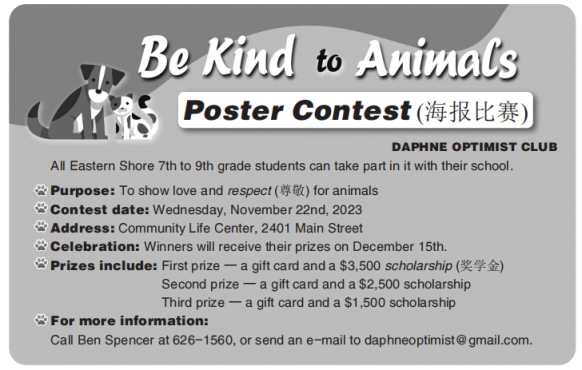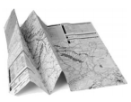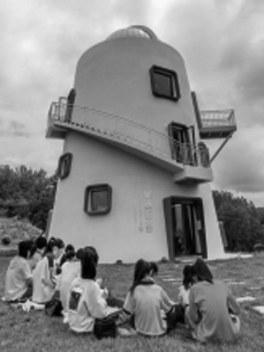One day, the Chows and their 4-year-old son Charlie were taking a bus to Century Park. On their way, Charlie suddenly said, "Look, Dad! The driver has the1 watch as me!"
Then he walked up to the bus driver and said, "Hello! My watch is no different from yours." Mr. Chow called him back and said, "Charlie! Can't you see the2 ? You mustn't talk to the driver. It's3 !"
"Sorry, Dad," said Charlie.
When they 4 the park, they walked to the lake. There was a beautiful view (风景) around and it was a very peaceful place. Mr. and Mrs. Chow sat down on a bench (长凳).
Charlie asked, "Dad,5 my electric toy car be driven here?" "No, Charlie. You will disturb (打扰) others," said Mr. Chow. Then the Chows took Charlie somewhere else6 staying by the lake.
Charlie drove his car all afternoon. He had a great time. At four thirty the Chows wanted to7 . "Come on, Charlie! It's time to go home," said Mr. Chow.8 Charlie kept on driving. "Charlie, please be a good boy!" said Mrs. Chow. Charlie stopped driving and said, "But, Mom and Dad, I'm a9 now. Remember the sign on the bus? You aren't allowed to10 to me when the car is moving!"
"Good try. Charlie!" said Mr. Chow, laughing. "But we have to go home now."
One day, Mrs. Green asked her class, "Does anyone think that they have1 since last year?" Danny put up his hand.
"I was very lazy when I was in the fourth grade," he said. "I2 did my homework. I didn'tbother(花费时间精力) going to the3 because I didn't like to read books. My parents4 all possible ways to make me work hard. They even didn't give me anypocket money (零花钱), and they didn't allow me to go out and play after school. But as soon as they went out, I would turn on the TV or5 .
"A park cleaner changed me. One morning, I was playing football in the park. The ballrolled(滚动) away and I ran to6 it up. I saw a cleaner sweeping up the leaves nearby. He was working very hard. When he saw me, he stopped and said, ‘Young man, doesn't the park look much7 now? I always work hard to make sure the park is clean. I tell you, I don't waste my life. Young man, don't waste8 either.'
"I9 the man's words on my way home. I said to myself, ‘I'm going to work hard to get good results at school. I won't be10 anymore.'"
Everyone gave Danny a big clap(鼓掌).

Do you love or hate April Fool's Day? Here are a few answers:
| I don't like April Fool's Day. It makes me a bit nervous. I keep thinking someone is about to play a boring trick on me. When twelve o'clock passes, I feelrelieved(放心的) that it's finished for another year. | |
I love April Fool's Day. I love playing tricks on people, and I don't mind if people play tricks on me. It's one day of the year you can be silly and have a laugh. You have to be quitesensible(理智的) for the other 364 days of the year, so I look forward to April 1st. |
| |
| April Fool's Day is a great idea. It's easy to forget the date, and I always believe everything I read in the newspapers or watch on the TV news, including the big national tricks. They always make me laughafterward(后来). | |
I hate April Fool's Day. Last year, people at work changed the sugar for salt, so we all put salt in our coffee! Then some joker in the office decided he wanted a day off, and he did something to the computers so they wouldn't work. It just wasn't funny! I had lots to do, and we all had to stop working and solve the problem. |
| |
Wen Xionghui is a calligraphy(书法) teacher who works at Dongyuan Senior High School in Heyuan, Guangdong Province. Every Friday afternoon, he travels to rural(农村的) areas in Heyuan to teach students calligraphy.
Wen started working as a volunteer calligraphy teacher in rural schools in 2014. For the past few years, he has taught in several schools. "It takes me at least 1.5 hours to reach the nearest school by bus, and over 3 hours to get to the farthest school," Wen says. The journey is harder if there's bad weather, but Wen has never missed a class. "I'm glad when I see students make progress. I feel tired but happy," he adds.
Most of Wen's students areleft-behind children(留守儿童). Wen says that although rural children start to learn calligraphy later than children in cities, this doesn't mean that they aren't excellent students. In fact, he always finds students with a talent for art in rural schools, and some have become quite skilled because they keep practicing.
Wen not only teaches students calligraphy in rural areas, but also spreads a love of traditional art and culture. "Teaching art is really meaningful in rural areas because there aren't enough art teachers there," Wen says.
Li Zhihong, an expert in calligraphy, thinks that Wen has set a good example for his students. "He has taught them that learning calligraphy requiresperseverance(毅力), just as what he has worked hard with for years," Li says.

Several weeks ago, my family took a road trip to visit my parents in Toronto, Ontario, Canada. Before that, my kids were asking where it is and how long it would take to get there. The kids had never seen Ontario on a paper map before. They kept asking me about the towns, parks and other places there.
The experience made me realize that it is necessary to teach kids to read paper maps. Nowadays, online maps and GPS are easy to get. Most of us adults learned to read them out of necessity (必要), but it's up to us to pass on the skill to our children. When kids learn how to use paper maps, they are doing more than just learning how to get around.
But what's more important is that paper maps show kids there's a much bigger world out there. They have the magic power to put ideas into kids' head. I remember as a child, I had many maps on my bedroom walls and I spent a lot of time looking at foreign countries, studying their shapes and city names. This made me become interested in those places. Now I've traveled to many of the countries I studied on the maps as a child.
It's always good to be prepared with skills that can get us out of a strange place without using a phone. A paper map may help a lot in that situation.
A. I wanted to know more about them. B. I then took out an old map from a box. C. But paper maps still have a role to play in our lives. D. Also, paper maps are good for emergencies(突发事件). E. Paper maps can help kids have a better understanding of distance(距离) and road signs. |

Xie Tianlei is a primary school student from a village in Changsha, Hunan. he is young, he knows a lot aboutastronomy(天文学). "I'm very(interest) in astronomy. I want to be an astronomer when I grow up," Xie said on a local TV show late last year. "It is amazing that there are many stars with lots of(mystery) in the sky for us to explain." Touched by the boy'sdesire(渴望) for knowledge, the TV show's production team decided(invite) some people to work together to build anobservatory(天文台) in the village.
Wang Qiu'an, adesigner(设计师), designed the observatory for free. "It's my honor to do something for village children," he said. Many local people and the local government helped a lot the building of the observatory.
On January 3, 2022, the observatory (open). Because of it, Xie and many children in his village have realized their dream of (enjoy) the night stars by getting closer to space. Some professional astronomers have come to the observatory more than 10 times to talk with the children and help (they) observe space.
The observatory has also attracted(吸引) around 300, 000 (visit). The local government plans to do more to attract more people to experience the (beautiful) of the village and the night sky.
You probably have heard of the Four Great Inventions of ancient China which brought great changes to the world in the past. Now, China's four greatinnovations(革新) in modern times are widely known among people from all over the world.
Online shopping is really convenient for Chinese people. From clothes to foods, from physical goods to virtual products, you can buy almost anything online. The popularity of online shopping has made the express delivery (快递) industry develop quickly. People can get the things they buy online in only two or three days after placing the orders, and it saves them a lot of time.
In Western countries, people usually pay bycredit(信用) card or incash(现金). But in China, more and more people, even old people, like to pay for things with their phones. Since the day mobile payments got popular in China, many Chinese people's wallets have been empty with only a few coins in them, which were left probably a few months ago.
Shared bikes are "the perfect first & last mile solution" for people. It's very convenient to use a shared bike without worrying about where to park it. Although it caused a lot of problems at first, most of them were solved with the help of the government.
China has the largest high-speed railway network(网络) in the world at present. The construction of high-speed railway in China has made great progress in the past 15 years. Some of the railways were even built under extreme natural environment. Chinese people are getting great benefits from the high-speed railway.
China's four great innovations in modern times | |
Introduction | The Four Great Inventions of ancient China changed the world in history, and now the world's attention is attracted by four innovations in modern China. |
Online shopping | People can buy almost anything online. The popularity of online shopping has pushed the of the express delivery industry. |
Mobile payments | Different from people in Western countries, more and more Chinese people like to pay on their . |
Shared bikes | Shared bikes are convenient. People don't need to about where to park them. |
High-speed railway | The high-speed railway network in China is than that in any other country. |
要点提示:
1. What trouble did you run into?
2. How did you deal with it?
3. What have you learned from it?
要求:
1. 内容要全面,语言表达要准确,语句要通顺、连贯;
2. 词数不少于80,短文的开头已给出,但不计入总词数。
As I grow, there are a lot of troubles around me. Today I'd like to share one with you.